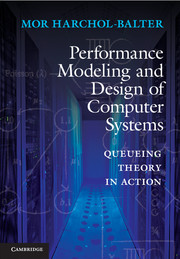Book contents
- Frontmatter
- Contents
- Preface
- Acknowledgments
- I Introduction to Queueing
- II Necessary Probability Background
- III The Predictive Power of Simple Operational Laws: “What-If” Questions and Answers
- IV From Markov Chains to Simple Queues
- V Server Farms and Networks: Multi-server, Multi-queue Systems
- VI Real-World Workloads: High Variability and Heavy Tails
- VII Smart Scheduling in the M/G/1
- Bibliography
- Index
VII - Smart Scheduling in the M/G/1
Published online by Cambridge University Press: 05 February 2013
- Frontmatter
- Contents
- Preface
- Acknowledgments
- I Introduction to Queueing
- II Necessary Probability Background
- III The Predictive Power of Simple Operational Laws: “What-If” Questions and Answers
- IV From Markov Chains to Simple Queues
- V Server Farms and Networks: Multi-server, Multi-queue Systems
- VI Real-World Workloads: High Variability and Heavy Tails
- VII Smart Scheduling in the M/G/1
- Bibliography
- Index
Summary
Part VII is dedicated to scheduling.
Scheduling is an extremely important topic in designing computer systems, manufacturing systems, hospitals, and call centers. The right scheduling policy can vastly reduce mean response time without requiring the purchase of faster machines. Scheduling can be thought of as improving performance for free. Scheduling is also used to optimize performance metrics other than mean response time, such as “fairness” among users, and to provide differentiated levels of service where some class of jobs is guaranteed lower mean delay than other classes.
Stochastic scheduling analysis, even in the case of the M/G/1 queue, is not easy and is omitted from most textbooks. A notable exception is the 1967 Conway, Maxwell, and Miller book, Theory of Scheduling [45], which beautifully derives many of the known scheduling analyses.
In this part, we study scheduling in the M/G/1 queue, where G is continuous with finite mean and variance.We are interested in mean response time, the transform of response time, and other metrics like slowdown and fairness. Throughout we are interested in the effects of high variability in job size distribution.
Scheduling policies can be categorized based on whether the policy is preemptive or non-preemptive. A policy is preemptive if a job may be stopped partway through its execution and then resumed at a later point in time from the same point where it was stopped (this is also called preemptive-resume). A policy is non-preemptive if jobs are always run to completion. Scheduling policies can be differentiated further based on whether the policy assumes knowledge of the job sizes.
- Type
- Chapter
- Information
- Performance Modeling and Design of Computer SystemsQueueing Theory in Action, pp. 471 - 472Publisher: Cambridge University PressPrint publication year: 2013



